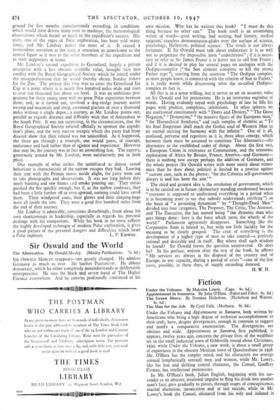Sir Oswald and the World
The Alternative. By Oswald .Mosley. (Mosley Publications. 7s. 6c1.)
SIR OSWALD Most.EY reappears—not greatly changed. He admires Germany as much as ever. He loathes Puritanism. He abhors democracy, which he either completely misunderstands or deliberately misrepresents. He sees the black and secret hand of The Higher Finance everywhere. And he remains profoundly convinced of his
own mission. Why has he written this book? "I must do this thing because no other can." The book itself is an astonishing welter of words—good writing, bad writing, bad history, Studied epigram,' ceaseless demonstration-glides over the surface of science, psychology, Hellenism, political science. The result is not always fortunate. If Sir Oswald must talk about endocrines it is as well not to perpetrate the impossible form " endochrynol" ; if it is neces- sary to refer to Sir James Frazer it is better not to call him Fraser ; and if it is desired to play for several pages on analogies with the Oedipus-complex (" the Son element conspires to kill the strong Father type "), starting from the assertion "The Oedipus complex, as most people know, is connected with the relation of Son to Father," it is really worth while discovering what the so-called Oedipus- complex in fact is.
All this is in a sense trifling, but it serves to set an accurate value on Sir Oswald and his pretensions. He is an inveterate exploiter of words. Having evidently toyed with psychology of late he fills his pages with phobias, complexes, inhibitions. In other spheres we are confronted continuously with "Doers and Deniers," "The Great Negation," Dynamism," "the massive figure of the European man," "the Hierarchical Synthesis," and such samples of rhetoric as "To his final Empyrean shall reach the Gothic soul of Western Man in an eternal striving for harmony with the infinite." Out of it all, confused, perverse and repetitive as it is, three ideas emerge, which between them must be assumed to constitute The Alternative—the alternative to the established order of things. About the first two, a European Union in resistance to Communism, and the economic exploitation of Africa by Britain, France, America—and Germany— there is nothing new except perhaps the addition of Germany, and the whole project (Sir Oswald writes with more sanity about econo- mics than he does about politics) is limited by a proviso against "current cant, such as the phrase: 'for the Colonies self-government always is and has been the aim."
The third and greatest idea is the revolution of government, which is to be carried on in future (democracy standing condemned because "everyone is supposed to understand everything in a period when it is becoming truer to say that nobody understands anything ") on the basis of "a persisting dynamism" by "Thought-Deed Men" divided into four categories, The Proposer, The Critic, The Assessor, and The Executive, the last named being "the dynamic man who gets things done: here is the force which turns the wheels of the world." Parliament apparently disappears. Something like the Corporative State is hinted at, but with too little lucidity for the meaning to be clearly grasped. The crux of everything is the development of a higher type of man to take control—a perfectly rational and desirable end in itself. But where shall such wisdom be found? Sir Oswald leaves the question unanswered Or does he? In his preface, written after the rest of the book, he affirms "My services are always at the disposal of my country and of Europe, in any capacity, during a period of crisis "—one of the few cases, possibly, in these days, of supply exceeding demand.
H. W. H.


































 Previous page
Previous page